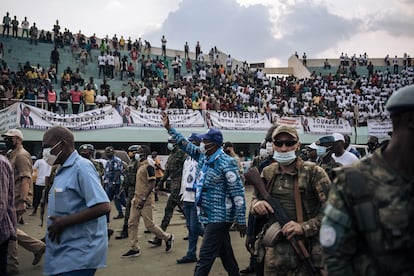US security company challenges Wagner group’s hegemony in its African stronghold
Bancroft Global Development, which has military training experience in Somalia, acknowledged discussions with the Central African Republic, which is seeking to ‘diversify’ its security relations

More or less orchestrated marches in favor of Wagner have been commonplace in the Central African Republic (CAR) since the Russian mercenary group installed itself in the country almost seven years ago. What was unusual and striking at the rallies last January, reported in the local press, was the appearance of a new graphic symbol — a lion’s head on a blue circle — on one of the banners being carried, next to the words “stop” and “non.” The logo, crossed out, is that of Bancroft Global Development, a U.S. private security company with long experience in training military personnel in Somalia. The rallies, on January 24 and 25, took place in the streets of Ndélé and Bangui, the CAR capital, where dozens of people marched near the U.S. Embassy shouting slogans against the “illegal entry” of Americans into the country. Only a few weeks earlier, Bancroft had admitted to negotiations with the CAR government over “possible future activities.”
The Central African Republic, which has around 5.5 million inhabitants, is Wagner’s great African laboratory; the most successful example of Russian foreign power — Vladimir Putin admitted last summer to contributing some $930 million to the group between 2022 and 2023 — deployed from the shadows by economic, propaganda and military means. It is also a paradigm of a formula repeated on the continent: a country rich in natural resources, including gold and diamonds, with rampant poverty and instability — CAR ranks 188 out of 191 on the Human Development Index. This is why, among other reasons, Moscow began in 2017 to build a business and security network that has won it strong popular support after years of clashes between Christian and Muslim militias, and money in the bank through the exploitation of the country’s mines. For Brussels and Washington, Wagner’s adventure has been accompanied by human rights abuses and the group has been placed on their lists of sanctioned entities.
At the end of last December, presidential spokesman Albert Yaloké Mokpème said in an interview with the popular station Radio Ndeke Luka that the country was “diversifying” its security relations, beyond its collaborations with Russia, Angola, Morocco and Guinea. President Faustin-Archange Touadéra’s spokesman added: “The United States is also offering to train Central African Republic soldiers, both on CAR soil and on American soil.” A few days later, responding to questions from AFP, Bancroft admitted a “framework of discussion” with Bangui for its future presence in the country had existed since July 2023. “That’s all,” the security company added. Jeune Afrique and Radio France Internationale have recently reported that the company has already sent some workers to the African country.
Both the State Department and the U.S. ambassador to CAR, Patricia Mahoney, have publicly denied that Washington had any involvement in Bancroft’s decision to enter the country, stressing that it is a private company that does not represent the government. The presence of U.S. uniformed personnel in CAR has a precedent from the era of the Obama administration, which in 2011 sent a group of military personnel to hunt down Joseph Kony, leader of the Lord’s Resistance Army, who remains unaccounted for. In addition to Russian mercenaries, the Central African Republic also hosts a European training mission and a United Nations contingent.
Experience in Somalia
The cornerstone of what is now Bancroft Global Development was laid in Virginia 24 years ago by its founder, Michael Stock, a young cum laude graduate of Princeton University and the scion of a wealthy American banking family. At the time, the company was called Landmine Clearance International. Nine years later, the firm adopted its present name and is now headquartered in Washington. It soon began to serve its flagship mission: Somalia.
In Somalia, rocked by more than three decades of conflict, Bancroft has trained Ugandan and Burundian AMISOM (now ATMIS) soldiers, a mission launched in 2007 by the African Union with U.N. backing. Stock’s company, made up of dozens of military experts from the U.S., Europe and South Africa, is behind the training of the Danab Brigade, one of the most prestigious units in the fight against the fundamentalist militia Al-Shabab.
As the company reports in the section of its website on financing, its largest contributor is the State Department. For example, the U.S. Office of Inspector General, which evaluates government spending, questioned in a July 2021 report over $4 million spent by Bancroft in Somalia, the origin of which was the State Department. To finance its operations, the company also relies on its own investments on the ground. In the registry of public purchases made by U.N. agencies, there are dozens of entries on leases of Bancroft’s properties signed by its mission in Somalia.
Whether with Washington’s approval or not, Bancroft’s move in the Central African Republic has agitated the Wagner group’s loyalists, who have been accused of massacres and torture by Human Rights Watch and U.N. rapporteurs. Until the death of Wagner leader Yevgeny Prigozhin seven months ago Alexander Ivanov, who headed the group of instructors who arrived in 2018 to train the Central African army and protect President Touadéra, was at the top of the management of the network in Bangui. According to the France-based research project All Eyes on Wagner, Moscow’s new strongman in CAR is Denis Vladimirovich Pavlov, an agent of the Russian SVR foreign intelligence services operating under diplomatic cover.
Sign up for our weekly newsletter to get more English-language news coverage from EL PAÍS USA Edition
Tu suscripción se está usando en otro dispositivo
¿Quieres añadir otro usuario a tu suscripción?
Si continúas leyendo en este dispositivo, no se podrá leer en el otro.
FlechaTu suscripción se está usando en otro dispositivo y solo puedes acceder a EL PAÍS desde un dispositivo a la vez.
Si quieres compartir tu cuenta, cambia tu suscripción a la modalidad Premium, así podrás añadir otro usuario. Cada uno accederá con su propia cuenta de email, lo que os permitirá personalizar vuestra experiencia en EL PAÍS.
¿Tienes una suscripción de empresa? Accede aquí para contratar más cuentas.
En el caso de no saber quién está usando tu cuenta, te recomendamos cambiar tu contraseña aquí.
Si decides continuar compartiendo tu cuenta, este mensaje se mostrará en tu dispositivo y en el de la otra persona que está usando tu cuenta de forma indefinida, afectando a tu experiencia de lectura. Puedes consultar aquí los términos y condiciones de la suscripción digital.









































